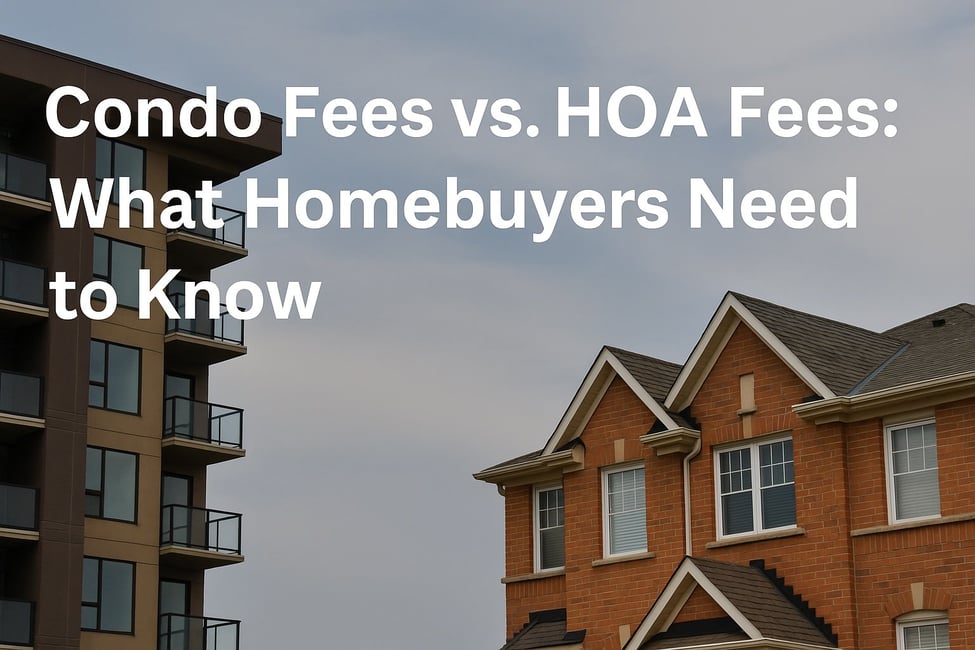When buying property in Alberta, one of the most important (and often overlooked) considerations is the cost of shared community fees. Two of the most common structures you’ll come across are condo fees and HOA (Homeowners Association) fees. While the terms are sometimes used interchangeably, they serve different purposes and can impact both your budget and lifestyle.
Here’s what you need to know before making your purchase.
What Are Condo Fees?
Condo fees—also known as condominium fees—are monthly charges condo owners pay to cover the cost of maintaining and operating shared spaces within a condo building. These fees are determined by the condo board and are based on the building’s operating budget and reserve requirements.
What Condo Fees Typically Cover:
Maintenance and Repairs: Upkeep of lobbies, hallways, elevators, and landscaping.
Utilities: Common area utilities such as water, heat, or electricity.
Insurance: Building insurance that covers the exterior and common areas.
Amenities: Costs for gyms, pools, security systems, and other shared facilities.
Reserve Funds: Savings set aside for long-term projects, like roof replacement or major mechanical upgrades.
Because condo fees are tied to a single building and its condo corporation, they’re specific to the residents of that property. For buyers, this provides peace of mind knowing that upkeep and long-term planning are taken care of.
What Are HOA Fees?
HOA (Homeowners Association) fees are more common in suburban communities or developments with shared amenities. Unlike condo fees, they aren’t tied to a single building but instead apply to the entire community.
What HOA Fees Typically Cover:
Community Maintenance: Upkeep of shared roads, parks, pathways, and green spaces.
Security: Gated entry systems or neighborhood security services.
Landscaping: Beautification and seasonal maintenance of common outdoor areas.
Amenities: Clubhouses, recreation centers, and playgrounds.
Administrative Costs: Management, accounting, and legal services for the HOA.
HOAs often focus on maintaining community standards, which can include rules about exterior home appearance, fencing, or landscaping to ensure uniformity.
Can You Be Charged Both Fees?
Yes. If your condo building is located within a community governed by an HOA, you may be responsible for both condo fees and HOA fees. For example, your condo fees would cover the building itself, while HOA fees would cover shared community features like parks, pathways, or recreational centers.
Key Differences Between Condo Fees and HOA Fees
Governance and Decision-Making
Condo Fees: Managed by a condo board elected by unit owners, focusing only on the building.
HOA Fees: Managed by a board representing the broader community, with authority over neighborhood-wide issues.
Fee Structure
Condo Fees: Fixed monthly charges that may increase if costs or reserve fund needs rise.
HOA Fees: Can be charged monthly or annually, with amounts varying widely depending on amenities and services.
Impact on Property Value
Condo Fees: Higher fees may raise concerns for some buyers if they feel costs outweigh benefits.
HOA Fees: Excessive or restrictive HOA rules can affect resale appeal, but well-managed HOAs often enhance community value.
Making the Right Choice
As a homebuyer in Alberta, it’s important to review any fee structure carefully before committing to a property. Ask for:
A breakdown of what the fees cover.
Details on the condo or community’s budget.
Reserve fund information (for condos).
These fees not only impact your monthly costs but also reflect how well the property or community is managed.
Final Thoughts
Whether you’re purchasing a condo with clearly defined monthly fees or a home in an HOA-managed community, being informed is key. Understanding these costs upfront ensures you can budget wisely and feel confident about your investment.
📌 If you’re exploring condos or communities in Alberta and want expert guidance, reach out to Deonte Doslov-Doctor for up-to-date insights tailored to your situation.
Disclaimer: The information provided in this blog is for informational purposes only and is accurate as of the date it was written. Always do your own research or connect with a licensed professional for current details.

